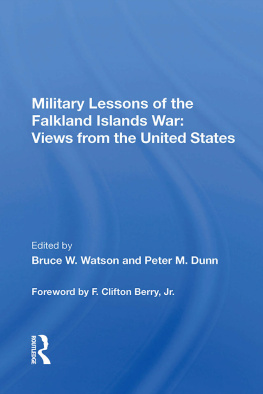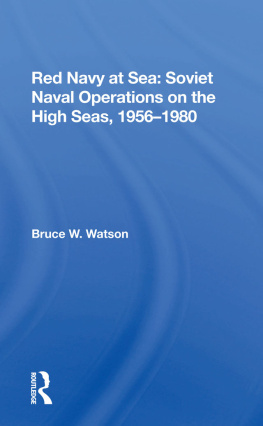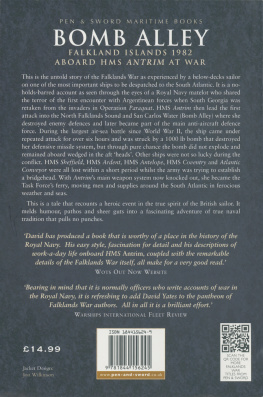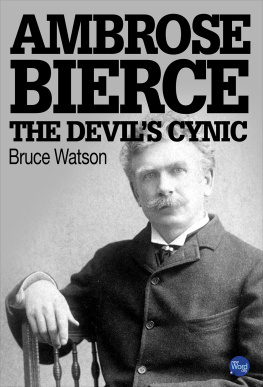Military Lessons of the Falkland Islands War: Views from the United States
Also of Interest
The Armed Forces of the USSR , Second Edition, Revised and Updated, Harriet Fast Scott and William F. Scott
Red Navy at Sea: Soviet Naval Operations on the High Seas, 1956-1980 , Bruce W. Watson
About the Book and Editors
Military Lessons of the Falkland Islands War: Views from the United States
edited by Bruce W. Watson and Peter M. Dunn
The Falkland Islands war brought into sharp focus the historical essentials of victory: the valor of individual soldiers and of teams, on the one hand, and the imaginative and bold use of contemporary technology, on the other. This conflict, involving the commitment of superbly trained, professional soldiers by the British and the commitment of traditional and high-technology weapons by both sides, may offer more significant lessons than any other major war of recent years.
This book contains analyses of the war by several prominent U.S. experts on national security affairs. Their observations reflect the continuing debate on such key issues in U.S. defense planning -- and in Soviet defense planning as well as the controversy over large versus small carriers, the advantages and disadvantages of a diesel- versus a nuclear-powered submarine fleet, the effectiveness of the Harrier-type airplane, the influence of high technology on amphibious warfare, and the ever-increasing use of "smart" weapons by all-purpose conventional armed forces.
Perhaps the most important lesson to be learned from the war is that there have been no quantum leaps in our knowledge of how to project power and how to fight a war far from home. Ultimately the foot soldier, well trained and capably commanded, was the key to victory. High-technology weapons, while important, were not the decisive factor. The V/STOL concept, as embodied in the Harrier plane and the use of small carriers, was vindicated, and the absolute necessity for different and separate management of naval and amphibious operations was again proven.
Intelligence provided by special troops augmented national intelligence systems and was also vital for victory. In the domestic arena, decisive action by the British government overcame an emotionally unified but otherwise deeply fractured Argentine political military leadership. And overall, Britain's management of the war, including the use of communications, was far superior to the Argentine performance.
BRUCE W. WATSON (Commander, U.S. Navy) is director of research at the Defense Intelligence School and is an adjunct professor in the Russian Area Studies Program at Georgetown University. Dr. Watson is the author of Red Navy at Sea (Westview/Arms and Armour Press, 1982).
PETER M. DUNN (Colonel, U.S. Air Force) is a veteran of three combat tours in Vietnam and is presently the assistant provost for research at the Defense Intelligence College. He is the author of the forthcoming book The First Vietnam Mar (Indochina 1945-46) .
Military Lessons of the Falkland Islands War: Views from the United States
edited by Bruce W. Watson and Peter M. Dunn
Foreword by F. Clifton Berry, Jr.

First published 1984 by Westview Press, Inc.
Published 2021 by Routledge 605 Third Avenue, New York, NY 10017 2 Park Square, Milton Park, Abingdon, Oxon OX14 4RN
Routledge is an imprint of the Taylor & Francis Group, an informa business
Copyright 1984 by Taylor & Francis
All rights reserved. No part of this book may be reprinted or reproduced or utilised in any form or by any electronic, mechanical, or other means, now known or hereafter invented, including photocopying and recording, or in any information storage or retrieval system, without permission in writing from the publishers.
Notice:
Product or corporate names may be trademarks or registered trademarks, and are used only for identification and explanation without intent to infringe.
Library of Congress Catalog Card Number: 83-51158
ISB N (U.S.): 0-86531-693-7
ISB N (U.K.): 0-85368-638-6
ISBN 13: 978-0-3670-1556-5 (hbk) ISBN 13: 978-0-3671-6543-7 (pbk)
DOI: 10.4324/9780429045424
Contents
, F. Clifton Berry, Jr.
, William J. Taylor, Jr., and Brad Roberts
1 SUBMARINE LESSONS, William J. Ruhe
2 LARGE VERSUS SMALL CARRIERS, James L. George
3 SURFACE COMBATANT LESSONS, Norman Friedman
4 AIR POWER LESSONS, Earl H. Tilford, Jr.
5 AMPHIBIOUS LESSONS, Frank Uhlig, Jr.
6 GROUND WARFARE LESSONS, Harry G. Summers, Jr.
7 SMART WEAPONS, William J. Ruhe
8 INTELLIGENCE AND WARNING LESSONS, Gerald W. Hopple
9 LESSONS LEARNED AND UNLEARNED, Peter M. Dunn
- 1 SUBMARINE LESSONS
- 2 LARGE VERSUS SMALL CARRIERS
- 3 SURFACE COMBATANT LESSONS
- 4 AIR POWER LESSONS
- 5 AMPHIBIOUS LESSONS
- 6 GROUND WARFARE LESSONS
- 7 SMART WEAPONS
- 8 INTELLIGENCE AND WARNING LESSONS
- 9 LESSONS LEARNED AND UNLEARNED
Guide
Foreword
F.CliftonBerry,Jr. Editor in Chief, Air Force Magazine
In this work, several of my colleagues discuss the major military lessons of the Falkland Islands War. Together they can be said to compose an American view of the conflict. My purpose is to present an overview of these lessons, which will serve as an introduction to the more detailed discussions that follow. In this respect, a recurring refrain runs through all the "lessons learned" that have so far come out of the conflict in the South Atlantic. It is this: these are not new lessons. Instead, they are replays of similar lessons from past wars.
Both sides relearned the obvious. A nation goes to war with what it has, not with what it would wish to have. For the British, add the lesson that war does not necessarily break out when and where you planned for it to occur. For the Argentine leaders, add the important lesson that one must be prepared to go all the way when one begins escalating a dispute from the diplomatic to the martial.
Cataloging the lessons learned from the Falklands conflict rapidly became a worldwide growth industry in mid-1982, with armed services planners and military thinkers in and out of governments on both sides of the Atlantic scrambling to develop useful data. For the military, it meant trying to derive, from the scant information available, lessons that might be applicable to their own equipment and organizations. For many of the civilians, the lessons included figuring out which ones supported their pet projects or theories. And for manufacturers, the lessons that validated their weapons could be turned into useful selling points with customers, present or prospective. In this context, the lessons that follow should be considered indicative rather than exhaustive, and tentative instead of conclusive.
PERSONNEL
One of the immutable lessons of any war is that the quality of the individual fighting man is paramount. In this case, the airmen on both sides can be proud of their record of individual skill, courage, and tenacity. The Argentine Air Force emerged from the war with high morale despite severe losses, and the Royal Air Force and Royal Navy aircrews returned from the conflict no less proud of their achievements. These accomplishments reflect the validity of rigorous selection and training policies in the air arms of both countries and the high quality of their leadership. They also show the importance of flexible thinking in aircrews that allows them to adapt to unforeseen or changing circumstances.












